
Having an online presence is essential for businesses and individuals alike. Whether you're an ecommerce store, a local service provider, or a content creator, your success depends on how easily people can find you online. Keeping consistency is challenging, but we’re here to help with one of your common questions: what is SEO marketing?
No worries needed. This article will explain what SEO marketing is and how it comes into play. If you have yet to learn what it is, just as an introduction, Search Engine Optimization (SEO) is a set of strategies and techniques to improve a website's visibility in search engine results. And we know that visibility on the internet is essential to your online store.
With no further ado, let’s delve into the world of SEO marketing. After reading this, we know you will understand its importance, the key components, and how businesses can leverage it to enhance their online presence. 😜
Understanding SEO marketing
SEO marketing, or search engine optimization, is optimizing a website to rank higher in search engine results for specific keywords and phrases.
When users search for information, products, or services in the search engines, SEO aims to enhance a website’s visibility on the SERPs (search engine results pages), increasing the likelihood of attracting organic traffic.

Here you can see the SERP for the term Shoplazza, where Google ranks the information based on online organic content.
You don’t need to pay anything to start doing SEO practices, meaning this is a low-cost way to boost your store traffic.
What are search engines?
A search engine is an online tool or software application that allows users to search for information, web pages, images, videos, and other types of content on the internet, like Google, Bing, or Yahoo.
Their job is to index vast amounts of web pages and content from various websites across the internet and then provide relevant search results to users based on their search queries.
Searching using a search engine typically involves crawling: the search engine websites use automated programs called web crawlers or spiders to browse the internet and collect information from a web page.
These crawlers follow links from one page to another, indexing the content they find and raking the content on SERPs so users can choose what they want to access.
Improving search engine results
With millions of websites competing for attention on the internet, ranking well on search engines has become crucial for gaining visibility and driving traffic to a website.
Statistics show that most users only click on the top few results displayed on the first page of organic search results, making it imperative for businesses to rank higher to attract potential customers.
That’s why Google commonly uses the first ranks to sell advertising spaces, making businesses that want to be featured on the top of the SERP pay money to be there.

For example, Air Canada and Expedia are two companies that leverage SEM and paid traffic sources to offer their products and services on SERPs. For instance, in the image above, we looked for flights to Brazil, but the companies can make ads appear with different keywords related to them.
Search engine optimization vs. search engine marketing
While SEO and search engine marketing (SEM) are related, they are distinct concepts.
SEO focuses on optimizing a website to improve its organic search engine rankings, while SEM involves paid advertising to appear on search engine results. One of the most famous examples is google ads.
Both ways can effectively drive traffic to a website, but SEO is a long-term strategy that requires consistent effort and optimization. In contrast, SEM delivers immediate results but requires continuous investment.
Critical components of SEO marketing
SEO looks super simple. However, SEO specialists worldwide deal with daily tasks to improve websites’ SERP positions.
Crawlers look for good texts or images, website structure, link building, and navigation. This means to be ranked, you don’t need to be only a good writer but have knowledge and experience enough to optimize your website to be indexed by search engines.
We listed a few important aspects to build your website and SEO strategy, so pay attention to the details: they’re essential.
Keyword research
Keyword optimization and research are the foundation of any successful SEO strategy. This is the first thing you should consider while creating content for search engines.
It involves identifying relevant keywords and phrases that users use when searching for products, services, or information related to a website's content.
By understanding these search queries, businesses can tailor their content and meta tags to match user intent, improving their chances of ranking higher in search results.
On-page SEO
On-page SEO refers to on-page optimization for individual web pages to improve their visibility on search engines!
This includes optimizing the meta title, meta descriptions, heading tags, and URL structure to incorporate relevant keywords in the content.
Google and other search engines can read these meta descriptions and title tags to rank your page. So, if you’re starting a blog or developing your website, you should pay attention to these details because they’re one of the reasons why users are finding your page.
Don’t forget that creating high-quality content that provides value to users is also crucial for on-page SEO success. It’s all about valuable content.
Off-page SEO
Contrary to the on-page, off-page SEO involves external factors that impact a website's search engine rankings.
One essential aspect of off-page SEO is link building, which involves acquiring high-quality backlinks from other websites. Search engines view backlinks as votes of confidence, signaling that the linked website is trustworthy and valuable.
While reading this article, you probably noticed that we have a lot of links related to other articles we published. This is us using off-page SEO strategies, linking our blog posts to show the search engines we have authority in what we’re teaching. 🙋
Technical SEO
Well, this is the most tech-related part of SEO. To appear on search rankings, you should constantly perform technical optimization on your webpage. Optimizing the technical aspects of a website will improve its performance and crawlability for search engine crawlers.
This means devs must pay attention to the website structure, optimize site speed, implement XML sitemaps, and fix crawl errors while coding.
Search engines are always looking for websites that can easily show users the information they want quickly and with a great structure.
Local SEO
If your business is online, has a physical location, or serves a specific geographic area, Local SEO can help you!
It involves optimizing a website to rank higher in local search results, such as "restaurants near me" or "plumbers in [city]."
Google helps you with this. If you’re opening an online business or already have one, you can create a Google Business Profile for your company, adding information such as address, opening hours, and contact ways. This helps the search engine to rank you and display your business when a user is looking for your services.
Mobile search optimization
Given the increasing number of users accessing the internet through mobile devices, mobile search optimization is critical.
Websites must be computer- and mobile-friendly and offer a seamless user experience across various devices in different systems.
If your website is not mobile-friendly, chances are you’re not getting much traffic because you can reach many users online.
Implementing a successful SEO strategy
Creating an effective SEO strategy requires careful planning and consistent effort since it works long-term. You’re not going to be featured on the first page.
As a business owner, we know you’re busy dealing with marketing, trying to increase sales, logistics, and everything related. That’s why we’re here to help you with some steps to develop and execute a successful SEO marketing plan.
Conduct keyword research
Utilize keyword research tools to identify relevant keywords and search phrases that align with your business or content. For instance, many tools in the market can help you analyze the amount of organic traffic specific keywords are getting and what is trending on the search engines.
If we can advise you, you should target keywords with a significant search volume and low competition to increase your chances of ranking higher. Companies are monitoring famous keywords and creating content for years to appear on the top of the SERP, so you should try to find keywords that aren’t on their radar.
Optimize on-page elements
As we told you before, meta descriptions and tags are essential to rank your page on search engines. You must strategically review and implement your target keywords in page titles, meta descriptions, heading tags, and within the content.
Ensure your content is informative, valuable, and engaging for users, but keep an eye on technical and on-page elements.
Create high-quality content
Search engines prioritize high-quality content that addresses user queries and provides valuable information, so you must keep that in mind while creating your content.
When writing your blog article, add value, using keywords related to the search to create informative and unique content that stands out from your competitors.
This article is an excellent example of how to create content: we’re adding value to your journey in SEO, giving you all the information you need to start an online business successfully.
Build quality links
If you want to start a blog, inserting internal links in your articles may be difficult since you don’t have enough content. No pressure. With time you’ll have many well-written articles that will be used as the subject of your content production.
But this doesn’t mean the only links you should use are from the articles you wrote. You can acquire external links from authoritative and relevant websites. The internet has many blogs and pages that want to collaborate with you. Exchange articles and quality links with them so you can both leverage this.
You can collaborate, focusing on natural link-building strategies, such as guest blogging, content marketing, and networking with other websites in your niche.
Implement technical SEO
This is more complicated, but you must ensure your website is technically optimized for search engines. This includes improving site speed, fixing broken links, and creating an XML sitemap.
If you don’t understand any of it, don’t worry. Shoplazza, for instance, is an ecommerce platform that provides users with all the SEO tools they need to build a significant SEO presence. Our website is technically optimized, so you don’t need to worry about it.
Monitor and analyze
This is something familiar in all marketing areas. To keep your results consistent, you must regularly monitor your website's performance using a keyword research tool – remember that keyword research is a type of market research – like Google Analytics or Google Search Console.
Analyzing the data will help you identify improvement areas and make data-driven decisions to increase your traffic and sales revenue. Improving search engine rankings is something that takes time.
Stay updated on SEO trends
Content marketing is constantly evolving, and as a part of it, SEO is an ever-changing field, with search engine algorithms continually being adapted to users and industry realities.
Stay updated with the latest SEO trends and best practices to ensure your strategies remain effective, and always remember to study continuously. As we told you, this needs focus and constant monitoring for your website performance and your performance as a manager!
White hat SEO vs. black hat SEO
As businesses strive to rank higher on search engines, they may be tempted to use unethical practices to manipulate rankings quickly. 🙅
White hat SEO refers to ethical SEO techniques that comply with search engine guidelines and focus on providing value to users. On the other hand, black hat SEO involves using deceptive tactics to achieve quick results, such as keyword stuffing, cloaking, and buying low-quality backlinks.
For example, if you generate hundreds of articles on the same topic through AI, the search engines will probably notice that you’re not being ethical, and your whole strategy can backfire.
Engaging in black hat SEO can lead to severe penalties from search engines, including de-indexing or banning from organic search results. Businesses must prioritize white-hat SEO to build a sustainable online presence and maintain long-term success.
In conclusion, what is SEO marketing?

In conclusion, Search Engine Optimization (SEO) marketing is a powerful tool that can significantly impact a website's visibility and organic traffic.
By understanding the critical components of SEO and implementing a well-rounded strategy, you can improve your business presence in search engine rankings and attract more views from your target audience!
Remember that SEO is a continuous process that requires dedication and adherence to ethical practices, and quality always comes first, then quantity.
As search engines evolve, staying updated with the latest SEO trends and best practices is crucial for long-term success in the digital landscape. So, are you ready to start your search engine marketing journey now? 👍
FAQ: what is SEO?
1. What is SEO marketing, and how does it work?
SEO marketing, also known as search engine optimization, is optimizing a website to improve its visibility on search engines like Google and Bing. It involves strategies such as keyword research, on-page and off-page optimization, technical optimization, and more.
The goal is to rank higher in search engine results for specific keywords, making it easier for users to find your website when they search for relevant information or products.
2. How can SEO marketing improve search engine rankings?
SEO marketing employs keyword optimization, creating high-quality content, building authoritative backlinks, and ensuring technical optimization.
Implementing these strategies makes your website more attractive to search engine algorithms, resulting in improved rankings on search engine results pages (SERPs). As your website ranks higher, it becomes more visible to users, increasing the chances of attracting organic traffic.
3. What is the difference between on-page and off-page SEO?
On-page SEO optimizes individual web pages using relevant keywords in meta titles, descriptions, content, and headings.
It also involves optimizing URL structures and ensuring a positive user experience. On the other hand, off-page SEO focuses on external factors such as acquiring quality backlinks from other websites, social media presence, and online reputation building. Both on-page and off-page SEO are essential for a comprehensive SEO strategy.
4. How does keyword research contribute to successful SEO efforts?
Keyword research plays a pivotal role in SEO marketing. It involves identifying the words and phrases users type into search engines when looking for information.
By conducting keyword research, businesses can understand user intent, discover relevant topics, and create content that addresses these queries.
Targeting the right keywords helps optimize web pages effectively, enhancing their chances of ranking higher and attracting organic traffic.
5. What is the significance of local SEO in digital marketing?
Local SEO is crucial for businesses targeting specific geographic areas. It involves optimizing your online presence to rank higher in local search results.
This includes creating and optimizing Google My Business listings, ensuring consistent business information across online directories, and acquiring reviews from local customers.
Local SEO helps businesses appear in "near me" searches and increases visibility among potential customers in their local area.


